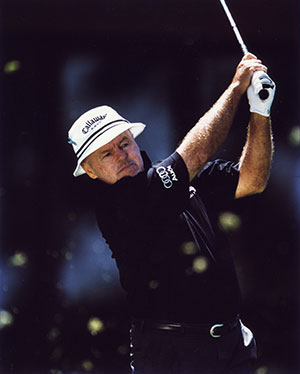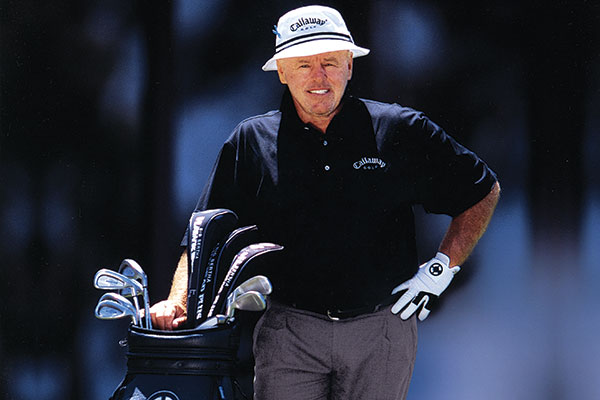Pro Golfer Jim Colbert
on Surviving Prostate Cancer
Jim Colbert, who has been playing golf professionally since 1965, is easy to spot on the golf course. He’s the one with the floppy white hat and the shirt with the turned-up collar. What began as sun protection has now become a trademark for the 68-year-old golfer.
During his stint on the PGA Tour, Jim won eight times, including twice in 1983 when he finished a career best 15th on the money list. Following his retirement from the PGA Tour in 1987, he spent three years as a golf analyst for ESPN before joining the Champions Tour in 1991. As a senior, his game only got better. He has won 20 tournaments on the Champions Tour, including the 1993 Senior Players Championship, and in 1995 and 1996 he was voted Senior Tour Player of the Year by his peers.
Considered at the time to be one of the fittest players on the Senior Tour, prostate cancer was not something Jim had ever really thought about. That is, until a chance encounter with good friend and fellow golfer Arnold Palmer. The two were at La Costa Resort in San Diego where Arnold was to present Jim with the 1996 Arnold Palmer Award later that evening. “My wife and I were walking down the hallway,” Jim recalls in an interview with Coping® magazine. “We ran into Arnold, and he said, ‘I just found out I have prostate cancer.’” It was a wake-up call.
During his yearly physical, Jim had a PSA blood test. His PSA level was slightly elevated, so his doctor ordered a biopsy. “And by nine o’clock the next morning,” Jim says, “he told me I had prostate cancer.
“My first reaction, oddly enough, was anger,” he continues. “And it must have shown a little bit on my face because my doctor looks at me and says, ‘Jim, I am just the messenger.’” Now, 13 years later, he laughs when recalling the scene. But back then, his anger quickly turned to intense focus as he discussed treatment options with his doctor.

“My first reaction, oddly enough, was anger. And it must have shown a little bit on my face because my doctor looks at me and says, ‘Jim, I am just the messenger.’”
His doctor recommended surgery. However, Jim was not content to make his decision based on only one opinion. So he called for a second opinion. And a third. Both agreed with the first, and Jim chose surgery. The operation to remove his prostate was scheduled for two weeks later.
Those two weeks before the surgery “was the toughest part of the whole ordeal,” Jim admits. He played in two tournaments during that time, but he chose not to tell anyone outside of his family what he was facing. “I didn’t think the distraction would be fair to the other players,” he says.
He recalls one instance on the last hole of the first round of tournament play where he almost slipped. He was set up for a birdie putt from about five feet away, and “I missed the putt,” he says, “so I tapped it in. When my hand went into the hole to retrieve the ball, I said to myself, trying to find the positive in the situation, Well, that’s pretty good. You shot 72 and you’ve got cancer, too. But to me it sounded like a real voice, so I had to look around to see if I had actually said it out loud.” Keeping his diagnosis quiet turned out to be a little more difficult than he had originally thought.
What was more difficult, however, was sharing the news with his wife and three daughters. “They were on the computer and at the library reading all this stuff about prostate cancer,” Jim says, “but so much of it is bad news, and I didn’t want anyone to get all worked up and worried over what may happen. I didn’t want to base my case on someone else’s. I just wanted to have the surgery and then find out where I stood.”
And that’s what he did. The surgery was successful, and Jim soon was back on the golf course. Following a quick recovery, he went on to win the Transamerica Championship in 1998. One of his greatest comebacks – it earned him the peer-voted Comeback Player of the Year award. He also became a vocal advocate for prostate cancer awareness.
Now cancer-free for 13 years, Jim still plays on the Champions Tour. “I am 68 now, so the golf game is a lot harder to play. The ball is a little too close to me after I hit it,” he jokingly admits, “but my overall health is just fine.”
This article was published in Coping® with Cancer magazine, January/February 2010.


